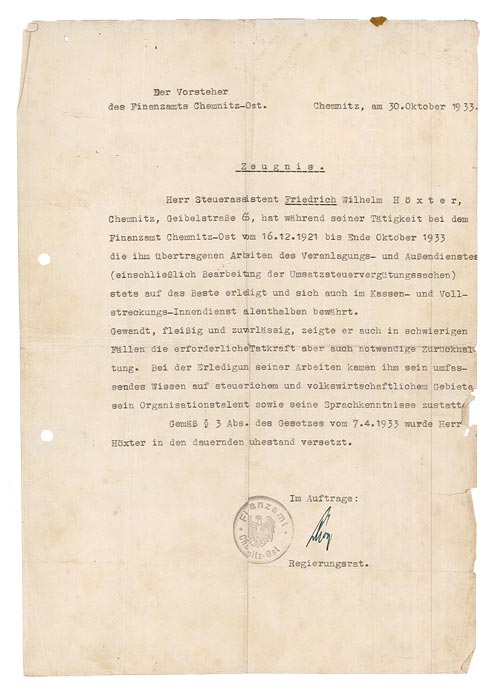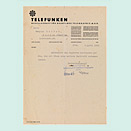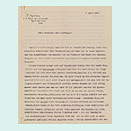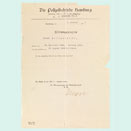Monday
30 October 1933
Reference letter issued by the Chemnitz-Ost taxation office to Friedrich Wilhelm Höxter
Friedrich Wilhelm Höxter (1896–1962) was able to continue his work at the Chemnitz-Ost taxation office for seven months after the Law for the Restoration of the Professional Civil Service—designed to remove Jews from the ranks of government employees—went into effect. However, on 30 October 1933 he too was "permanently retired from his position," ending his eleven-year career as a tax assistant. The taxation office gave Höxter a glowing letter of reference that leaves little doubt that they would have liked to retain this "capable, hard-working and reliable" employee. He is described as a man with extensive knowledge, organizational ability and language skills, a worker who always performed his assignments "with great proficiency" and proved his worth "in every way." That these were not empty words is revealed by the fact the Chemnitz taxation office continued to employ Höxter despite the Reich Finance Ministry‘s decision to terminate his contract in July.
The thirty-seven-year-old immediately found a new position as an assistant auditor for a non-Jewish tax specialist in Chemnitz, where he remained until late February 1935. He received an excellent reference letter from this employer as well. He left the firm at his own request in order to get married and move with his wife, Philippine, to Breslau. We do not know whether or where Friedrich Wilhelm Höxter worked in this new city. He was evidently able to escape arrest during the pogroms of November 1938. In early 1939 he made plans to immigrate with his wife to South Africa, where a cousin had guaranteed them a livelihood for two years. As fate would have it, though, the couple went to Shanghai instead, where they were able to survive the Second World War.
After the war ended, Friedrich Wilhelm Höxter apparently gave serious thought to returning to Germany. In September 1946 he made inquiries with the city of Chemnitz as to job opportunities at the finance department. The city replied: "We of course have an interest in the return of former Chemnitz residents who, like you, were forced to leave against their will and who are fit and able to help with reconstruction." In fact, the position of director of the taxation office needed to be filled immediately. The letter continued: "On the other hand, in view of the importance of this position and the urgent need to fill it, please understand that we cannot necessarily commit ourselves to hiring you. However, even if the position has already been filled by the time you return or we cannot select you for other reasons, we believe that there will certainly be other employment possibilities for you in the civil service."
In the end, Friedrich Wilhelm Höxter did not return to his native city of Chemnitz. From September 1947 to January 1948 he worked as an English teacher and lecturer at a college in Shanghai and then immigrated to the United States together with his wife. He died in Ohio fourteen years later at the age of sixty-six.
Aubrey Pomerance



